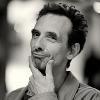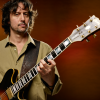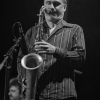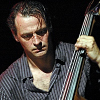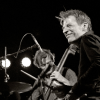Home »
Jazz Articles » Interview » Pierre de Bethmann: Sharing a Musical Breakfast in Lyon
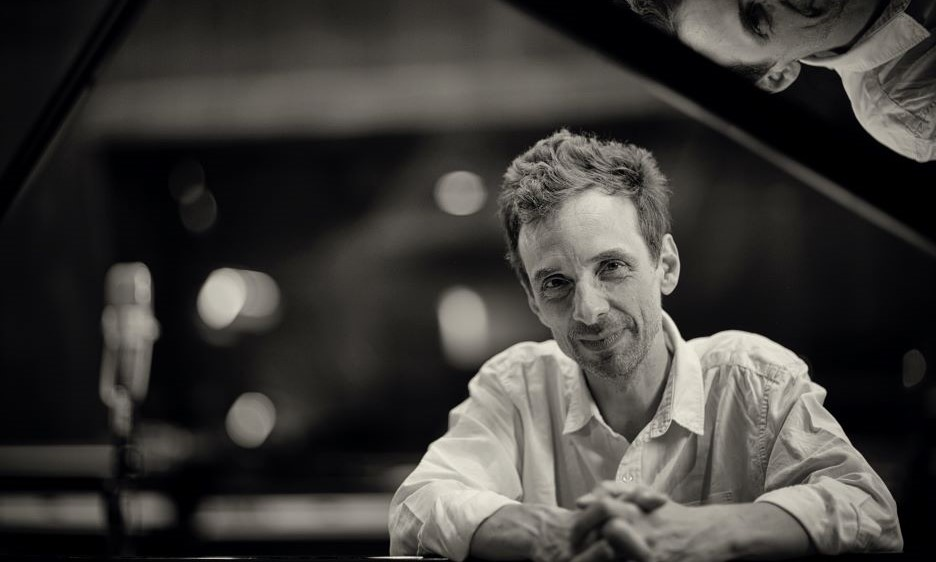
Courtesy Gildas Boclé
I had a classmate in high school who is now a great contemporary music writer. He led me into the music of the
‘40s, giving me my first opportunity to discover Charlie Parker, Dizzy Gillespie and early Miles Davis. It was a
blast
for me: I remember not having a clue about that music for six months, and then, all of a sudden, I started to
understand the way things were built. I remember I used to take my little sister’s cello and play, in pizzicato, the
roots, only the roots of the chords I had found by ear.
Pierre de Bethmann
If interviewing a musical figure is usually a great experience, having a face-to-face conversation with one is a true privilege. Besides, it is April in Lyon, cherry trees in blossom… and the roofs of the capital of the French region of Auvergne-Rhône-Alpes shine under a splendid spring sun.
Pierre de Bethmann
keyboards
”
data-original-title=”” title=””>Pierre de Bethmann, winner of the 2024 Victoire du Jazz award for Best Instrumental Artist (the French equivalent of the Grammys), greets us at Ludwig Laisné’s recording studio, where he is temporarily staying after a vibrant concert the night before at the beloved Lyon’s Hot Clubnothing less than the oldest jazz club in Europe, as its current president and artistic director, Laisné himself, tells us. While he explains, our host serves us a delicious, intense espresso, while De Bethmann offers freshly bought croissantsboth of which prove to be essential fuel for the smooth unfolding of the interview. In truth, it is more of a relaxed talk in the kitchen area next to the studio room: an informal, warmly genuine exchange that, at times, becomes extremely candid.
De Bethmann came into the media spotlight around 1995, whenalongside
”
data-original-title=”” title=””>Christophe Wallemme on double bass and Benjamin Henocq on drumshe founded
”
data-original-title=”” title=””>Prysm, a post-bop collaborative trio (the pianist has always strongly asserted that he was not its leader) that transcended the European scene and successfully broke into both American and Japanese circuits. After six intense years, the group made way for other projects led by the Parisian musician. The first was Ilium, a quintet founded in 2003 which later expanded to a septet in its final albums. Over the next six years, he explored a gentle electrification of his always-original compositions by replacing his acoustic piano with a Fender Rhodes and incorporating
”
data-original-title=”” title=””>Michael Felberbaum‘s electric guitar. In 2014, he continued with the Pierre De Bethmann Medium Ensemble, a group of up to twelve members featuring a strong presence of brass and reed instruments. This marked both a return to acoustic textures and a confirmation of his growing preference for lyricism often shaped into rounded forms. Over time, he gradually moved away from the angularity and rhythmic tension of his early years, favoring increasingly longer and more complex compositions of his own. His subsequent group, the Pierre de Bethmann Trio, brings a jazz-inflected approach to a wide-ranging repertoire of other composers, spanning classical music, singer-songwriter material, pop and rock. It is an innermost format and aesthetic, with which he has released five volumes so far under the shared title Essais. Alongside this are numerous other varied projects, ranging from flirtations with electronics, as in Shifters (ALEA, 2018), to the spectacular four-piano ensemble PianoForte, completing the portrait of a restless, prolific and deeply cultivated musical personality.
Throughout our conversation, De Bethmann reflects on his unique current moment, his personal and professional journey and his deep connection to musicsomething inseparable from his roots and beliefs. There is also room to explore some of his always carefully reasoned opinions on topics like the artist’s condition within the music industry, as well as his perspective on today’s jazz landscape, both in France and globally. All of this is presented below as faithfully as possible, attempting not to sacrifice the vivid spontaneity of his responses and his emphatic reactions. And since it was no secret to many around him that Pierre had been battling cancer for several years, continuing to play from time to time despite the treatment that affected him physically, it felt appropriate to ask a very personal question at the outset.
All About Jazz: First of all, how are you doing in terms of your health?
Pierre de Bethmann: Thanks very much for asking. I am still under heavy treatment, but the news is good. I’m often very tired, so I need a lot of sleep and I have ‘a couple’ of side problems. It has been incredibly tough, but I’m slowly getting back on track.
AAJ: But seeing you yesterday at the Hot Club, no one would have said you were convalescingor even tired.
PdB: I’m extremely well surrounded. I mean, the guys around me are very aware and thoughtful; we’re very close to each other, which makes things much easier. Actually, from the beginning of chemotherapy, I decided to try to keep the gigs I felt like being able to play, and at the same time, I couldn’t hide it, as I know I was physically transformed…
AAJ: It was around that time that you received the Victoire du Jazz award, correct?
PdB: Yeah, I felt like accepting the gig anyway…
AAJ: Back to the concert. Yesterday you pushed the music from Agapé (ALEA, 2025) to the very limit. That was in front of an enthusiastic audience that couldn’t stop shouting and cheering you on.
PdB: Yeah, the audience was very nice last night! Indeed, live performance is definitely a different experience. Although when we were in the studio in December 2023 for those two recording days that gave birth to Credo (ALEA, 2024) and Agapé, with obviously no audience, we did a rather limited number of takes for each tune. I remember the very first one, when we went back to the control room and listened to what we’d done, we found it very ‘live’ for a recording session. I remember us asking ourselves, “Should we leave it this way, or try to format it more?” And we all agreed that we shouldn’t format it any further, so we pretty much left it that way for all the tunes.
But the thing is that the audience gives us a certain energy that pushes us to some sort of limits. Is it conscious? I would say no. But do we accept it as a fact? I would say yes: we accept it as a parameter, and it’s true that since this music talks about our nature, striving to dig as deep as we can into what we’re able to express, we like to put it on some kind of energetic side.
AAJ: On stage, you seem to have a special connection with the quartet’s drummer.
PdB: Oh yeah. I’ve known ”
data-original-title=”” title=””>Antoine Paganotti for a while. We had the opportunity to play together in the mid-2010s, on one project of French guitarist ”
data-original-title=”” title=””>Pierre Perchaud in which we were both sidemen. Antoine really struck me; I loved both his playing and personality right away. I also remember this very moment at the end of the COVID lockdown when things opened up and we were allowed to move. We called each other and figured out we were basically neighbors. Then he went home, and we made a bunch of duo sessions with certain stuff I had been working on lately. We started this routine, and I discovered a wonderful artistic and human personality. Then I also found out that he and
”
data-original-title=”” title=””>David El-Malek, the quartet’s saxophonist and an old collaborator of mine, already present on the Ilium recordings, were long-time mates, so…
As times go by
AAJ: Let me point out a couple of things regarding last year, 2024. Firstly, how do you view this Victoire du Jazz award and prizes in general?
PdB: We obviously don’t choose to play this music for chasing any type of awards or institutional recognition, you already know that. I would say that when it comes to me, I’m grateful to accept it. I am also aware of the fact that in Europe, and probably in France specifically, we’re surrounded by a lot of people who want to support culture, and jazz in particular. This class of event also brings some sort of enlightenment to a rather marginal art form, and I guess I feel proud to be part of it.
AAJ: You actually started playing professionally after winning the Concours National de Jazz de La Défense in 1994, didn’t you?
PdB: That’s right! It was also important. I had started to jam in clubs in Paris, and we started this trio that would become Prysm. I was very happy with this honor, which eventually opened a couple of doors for me. And since I’m full of doubts, it also probably was one little element of self-confidence… Even though, in the end, the main elements of self-confidence come from what I feel from the other musicians I work with: if I sense we’re in a good working mood and share the same concerns, then I enjoy itI feel like I’m on a valuable path.
AAJ: Some of the public tends to believe that prizes and institutional recognition might come with a toll, such as increased accessibility or commercialism. Is that true?
PdB: Well, when we started Prysm, I was aware that we were probably the trendy group at that time, and that we benefited from a positive period for jazz regarding major companies’ interest in this art form. We were lucky enough to have this deal with Blue Note Records, but I have to say that even after receiving a couple of awards with Prysm initially, I never felt pressured to steer our work in a specific direction. Later, in 2000, when we disbanded the trio and I didn’t have a fixed record deal, I had to work with smaller labels. I wasn’t compelled then either, and having the Victoire recently just reinforces the idea that it’s wise to keep focusing on one’s goals and tastes.
AAJ: Also in 2024, you celebrated 30 years of your professional career. Would you dare to name your best and worst moments?
PdB: Wow, this is a difficult question, let me think…nothing obvious to me, even though intense touring can be exhausting… and extended periods of inactivity can be quite difficult as well. I’m actually slowing things down now, but when you’re actively touring, life on the road can sometimes be quite backbreaking… I guess my most challenging moments in recent years were probably on a personal level. I don’t want to dwell on this too much, as my family life is very peaceful now and… it truly is a blessing. And when I think of the best moments, it’s the birth of my kids: I mean, that’s the best, you know, it’s as simple as that (laughs).
AAJ: I would like to continue talking about significant dates. In the span of just seven years, from 1959 to 1965, what we might call a ‘brood’ of outstanding, internationally renowned French pianists was born:
”
data-original-title=”” title=””>Antoine Herve, ”
data-original-title=”” title=””>Laurent DeWilde,
Jean-Michel Pilc
piano
b.1960
”
data-original-title=”” title=””>Jean-Michel Pilc,
Michel Petrucciani
piano
1962 – 1999
”
data-original-title=”” title=””>Michel Petrucciani,
Jacky Terrasson
piano
b.1966
”
data-original-title=”” title=””>Jacky Terrassonand you, among others. Do you consider yourself part of a generation we might call ‘The illustrious baby boomers of French jazz piano’?
PdB: I would mention a couple of others. For example, one of my current projects is PianoForte, the four-keyboard band that features very serious pianists like
Bojan Zulfikarpasic
piano
b.1968
”
data-original-title=”” title=””>Bojan Zulfikarpasic, who is amazing,
Baptiste Trotignon
piano
b.1974
”
data-original-title=”” title=””>Baptiste Trotignon, who is mind-blowing, and
”
data-original-title=”” title=””>Eric Legnini, who is just as incredible as the others, so… Is there some kind of generation there? Um… there might indeed be a strong legacy in piano playing in France. We’ve had great musicians for decades, especially in Paris, which is obviously a fantastic place for all instrumentalists, but I did have the feeling at one point that Europe was ‘all about the piano’ (laughs)… although America isneedless to saya country of genius piano players, not to mention many other countries in Europe… of course… So, I don’t know. I feel like we definitely share some personal connections within this French pianist brotherhoodaside from Michel, whom I actually rarely met but truly admire, I have the sense that we’re all well-acquainted.
Roots, influencers and ‘Business as musical’
AAJ: Let’s now change to other types of relationships. You come from a family of German bankers and businessmen, but with deep roots in France. In the 18th century, one of them settled in Bordeaux as a consul, and later, your great-great-grandfather became mayor of the city. Even today, your surname is associated with various fields, such as winemaking. At first glance, it doesn’t seem like an environment conducive to serious musical dedication. On the other hand, you’ve mentioned on other occasions that you took piano lessons from the age of six and that your grandfather specifically introduced you to jazz. How would you assess your family’s influence on your love of music?
PdB: You traced my personal history on my father’s side, but on my mother’s side, it’s a completely different story, and it’s funny because when I was a kid, all my father’s family was into fine arts, you know, visual arts, and they loved the history of painting, etc. But on my mother’s side, they were really deeply rooted in music, so when you mention my grandfather, it’s my mother’s father; he had more or less Swiss roots, very much grounded in the Protestant tradition.
His family was almost completely tragically affected by World War One, and like quite a bunch of French families, he lost his father and several uncles. He was more or less a self-made man who made high-level studies, while keeping a strong bond with his still-living mother and with music… and jazz was the soundtrack of his generation. After World War II, he was fully immersed in it; I mean, he genuinely loved it, and a few years later, he shared his passion with me. I loved him, and I saw him almost every week in a little house he had in Normandy: we’d go there with my parents, and I could listen to records with him: he was totally into
Erroll Garner
piano
1921 – 1977
”
data-original-title=”” title=””>Erroll Garner, he was totally into
Sidney Bechet
saxophone, soprano
1897 – 1959
”
data-original-title=”” title=””>Sidney Bechet, he was totally into
Django Reinhardt
guitar
1910 – 1953
”
data-original-title=”” title=””>Django Reinhardt, he was totally into
Louis Armstrong
trumpet and vocals
1901 – 1971
”
data-original-title=”” title=””>Louis Armstrong, those precursors and geniuses from the old days… so that was the first step.
The second step in my learning path was when I was a teenager. I had a classmate in high school who is now a great contemporary music writer. He led me into the music of the ’40s, giving me my first opportunity to discover
Charlie Parker
saxophone, alto
1920 – 1955
”
data-original-title=”” title=””>Charlie Parker,
Dizzy Gillespie
trumpet
1917 – 1993
”
data-original-title=”” title=””>Dizzy Gillespie and early
Miles Davis
trumpet
1926 – 1991
”
data-original-title=”” title=””>Miles Davis. It was a blast for me: I remember not having a clue about that music for six months, and then, all of a sudden, I started to understand the way things were built. I remember I used to take my little sister’s cello and play, in pizzicato, the roots, only the roots of the chords I had found by ear; this way, I discovered the cyclic nature of the tunes, and I suddenly became aware of the form the realization that these geniuses didn’t improvise out of nothing.
Finally, as I completed my general studies, the third step occurred during my bachelor years: I met another classmate who led me into the music of the ’60s and ’70s, creating a perfect ‘chronological self-teaching’ process, you see.
AAJ: And then, after finishing those studies in Paris, you changed course and, in 1989, went to Berklee College of Music in Boston. But after one year, you returned to Paris to immerse yourself in the business world. Why?
PdB: Well, when I entered Berklee, I had a lot to practice and many things to get together, and at that time, being a musician was something certainly abstract. I felt I was learning a lot, especially by constantly participating in sessions (the school was open every night for this purpose), so I could progressively interact with more and more skilled people, which gave me some kind of self-confidence. But in the end, I still had very basic issues: I mean, I had had to borrow money to get there, and I figured out that the most interesting musicians I found over there were targeting to go to New York and, for me, I was not matching The Big Apple requirements, so after a while I felt like I had my time over there, and that it would be better for me to continue working through everything I had learned during that period, but somewhere else…
Plus, I probably needed Europe back. I loved the U.S. and cherished my American experience because it was fresh and demanding in terms of practice. I wanted to get there, and I was lucky enough to have really nice sessions at the end of 1989I recall a couple with
”
data-original-title=”” title=””>Jorge Rossy; he was very advanced. I still admire him so much. It was a great time, but I decided to return to Paris and… to pay back my loan. Of course, at that time, I also decided that I wanted to stand on my own, meaning I didn’t want to live with my parents anymore, so I sought a job where I could leverage my Parisian degree. On the other hand, I then chose to buy a piano, so I took out another loan! It took me a couple of years to pay off all that money and to be back on track without debts… and then, it was Prysm.
AAJ: But before Prysm, you worked as a financial consultant while performing nightly gigs in the Paris jazz club scene. Did you feel like an intruder in the music world, or did you think, “This is where I belong?”
PdB: Both. It was a very intense period of my life when I questioned myself a lot. I was doing quasi moonlighting, almost two jobs at the same time. On the one hand, I was absolutely dedicated to my company, and I didn’t want to mess things up. But it was also a time when I became more interested in what was happening in jazz in Paris, much more than when I was a student, when I would gather with my mates mainly to have a great time, but in this period I wanted to go there because I had the Berklee experience and probably felt a little stronger. So it was quite a hectic period, yeah.
Let’s get metaphysical (but not that much)
AAJ: I would like to talk a little about your beliefs, motivations and methods. About ten years ago, you stated in an interview: “It seems to me less and less possible to think of social harmony without personal balance.” Do you still feel the same, perhaps even more strongly now?
PdB: Wow, this is a little philosophical (laughs). Well, how should I phrase this? It has been saidby Wagner, as far as I understandthat “Music begins where language ends.” Music probably says something about the mystery of life. Perhaps it’s a little of what I meant yesterday at the concert, when I was trying to explain my titles… I always make fun of that, because it’s always tricky for me to come up with titles for music; sometimes it’s a play on words in French, and sometimes it’s not. When I mentioned “Agapé,” that’s a good example of what I mean: according to the ancient Greeks, Agapé is one of the greatest forms of love. They had three or four words for that: Philia, Éros, Agapé… I don’t speak ancient Greek, but it struck me.
For me, music is mainly about searching and healing. Certainly, it’s a discipline, with a culture and a very strong grammar, particularly in the realm of jazz. But on a personal level, I feel like I have experienced the sensual pleasure of research. All right, keeping on digging can be rather arduous and involves a lot of uncertainty, but at some point, I know it does me a lot of good; this is what I feel like sharing with an audience. Indeed, these kinds of concerns don’t put me on a perfect commercial track to be bankable, but this is what I feel compelled to communicate to an audience.
I am also aware that I can take advantage of the French support systems for the arts, which allows me to stay on my path: each time I produce something, I first try to find the right peopleand there is a whole bunch of amazing musicians in Paris these dayswith whom I can have a strong personal and professional connection; all this is to share a common emotion with the people who decide to buy a record, or listen to my stuff on the streaming platforms… and, definitely, this is about being together, like last night with a live audience.
AAJ: In that same interview, you mentioned that French audiences tend to focus on the intellectual and political content of music, which can sometimes overshadow the artistic side. You also highlighted that today’s musicians must juggle roles as performers, composers, teachers and even managers. This leads us to view certain music as an art form precariously cornered between market demands and the near-inevitability of being an artifact. How do you find the balancethat special place where artistry can thrive?
PdB: I guess it’s a kind of yin-yang process. I don’t want to present myself as a specialist in Taoism, but this philosophy has indeed gotten into my way, on top of my ‘still alive’ Christian roots. This yin-yang process, between the realities of the social environment and personal ideals, has always caught my attention.
This social environment reflects what we call in France ‘le métier,’ the ‘job’ aspect of musicthe necessity of making a living. As I mentioned, I’ve had to borrow money several times in my life; I have a family and bills to pay. All this interferes with artistic ideals. The fact is, pursuing this class of occupation means that sensitivity and emotion will play a big part in your life. So the answer is likely found in your question: the key is to find the right balance that works for you. If you engage in this dialectic, to phrase it in a very ‘French intellectual manner’ (laughs), discussing the political implications and artistic involvement, it’s true that I’ve met many musicians who wanted to stand their political considerations at first, or alongside their artistic work. I do not deny this, but my primary concern is determining where I want to go artistically, knowing that the simple act of sharing a deep feeling with people (and now we’re returning to the previous question) can impact their lives.
I would phrase things this way: Have you seen the amazing ”
data-original-title=”” title=””>Ken Burns documentary about the history of jazz? I remember a moment featuring a very conservative and racist guy from the southern US, who experienced a kind of epiphany simply by seeing Armstrong perform. He might have said something like: “I once listened to Louis Armstrong on stage, and I was blown away because for me, it was pure talent. And for me, it was obvious that this was a human being who had a lot to say to the world.” Of course, it might sound very pretentious; I certainly don’t want to compare myself to Armstrong (laughs). It’s just an ideal that I find most attractive: attempting to share as honestly as I can my artistic purpose, hoping it would raise some sort of emotion that can move people… just as it moves me! All this is about encounters, you know. This is what I believe music is all about.
But of course, we must consider our political environment, which is rather tough worldwide today, and also the aspect of self-management, for which I might be a little more prepared thanks to my experiences before becoming a musicianthat’s true.
AAJ: Tell me something about your compositional process.
PdB: It’s funny because I’m teaching at the CNSMDP (‘Conservatoire National Supérieur de Musique et de Danse de Paris’). It’s a great place, and it’s a great deal for me. I’m in charge of one workshop there, and let’s say it’s not a theoretical composition class because I don’t think I’m equipped to teach composition. When I received this assignment, I had to think about how I would approach teaching since I didn’t have any theoretical background in composition.
My personal experience when composing is about trying, trying, trying. It starts with any kind of ideait can be a rhythmic idea, it can be a melodic idea, it can be a form… And when I feel, “okay, this might be worth it,” I generally store it unfinished somewhere. Then, several situations can occur. The first possibility is that this idea leads me to a completion, so that tune gets composed in a very short time. But most situations are: there’s one idea, I store it, and then I gradually come back to it. This happened, for instance, with “Exo,” a theme that I recorded with the Medium Ensemble, which was based on a rhythmic idea that emerged while I was tapping my hand on the kitchen table, just like where we are now, I promise! It was like this (he knocks the table rhythmically).
I remember reading an interview with
Woody Allen
clarinet
b.1935
”
data-original-title=”” title=””>Woody Allen, who said he had lots of bits of ideas that he would write in a notebook and store in a shoebox. Later, he would open the shoebox from time to time and revisit this raw material to progressively build things up. This process inspired me; I continue to store bits of ideas, and then I have a routine where I return to it, attempting to work things out: one day, I focus on the harmonic side, another day is about the form, and another day is going to be about a melody. It’s very intuitive; it’s globally organized, but messy in the details because anything can be an idea. I think Thomas Edison said that creativity was “one percent inspiration, ninety-nine percent perspiration” (laughs)… I like this thought.
Future tenses, or a tense future?
AAJ: You’re always working on several initiatives simultaneously. Right now, you’re touring solo, with the Quartet, the Trio and PianoForte. But what about earlier projects like Prysm, Ilium or the Medium Ensemble? Could any of those groups be revived?
PdB: Possibly, I don’t know.
AAJ: Any plans to tour again in the States, like you did during the Blue Note years with Prysm?
PdB: I have to confess that I don’t. I was fortunate enough to tour the US many times with two main groups. First was Prysm, and we were proud of that. The second was a project where I was a sideman, with the Moutin brothers,
The Moutin Reunion Quartet
band / ensemble / orchestra
b.1961
”
data-original-title=”” title=””>The Moutin Reunion Quartet, featuring
”
data-original-title=”” title=””>Francois Moutin on bass,
”
data-original-title=”” title=””>Louis Moutin on drums,
Rick Margitza
saxophone, tenor
b.1961
”
data-original-title=”” title=””>Rick Margitza on saxophone, and me. It was a great period in my professional life. It was a highly energetic band, and also quite challenging in terms of artistry: they had many ideas, some of which presented seriously demanding rhythmic concepts, so it was very interesting. Plus, we got along really well. But at the moment, I don’t have any personal projects in the States… we all know how protectionist it is now, you know…(laughs).
AAJ: This contemporary straight-ahead jazz you play with this quartetor maybe we should call it 21st-century post-bopseems to be losing audiences year after year. Do you think there’s a way to reconnect with a broader audience, without having to dilute the music through equally respectable fusions with other genres?
PdB: That’s a very interesting question… It is true that, specifically in France, when you say ‘jazz,’ it has a whole bunch of meanings for people, ranging from one side of the spectrum to the other. Perhaps the two big tendencies we are facing today are: on one side, a very formatted approach, often based on some form of ‘mainstream vocalism,’ sometimes truly talented, to be honest; and on the other end of the spectrum, we find all sorts of fusions. And of course, there are trends, along with more or less ‘à la mode’ tendencies. Let’s say that in France, when you show that you have a ‘prog-rock,’ ‘pop,’ ‘world,’ or even contemporary music connection, it will often be easier to secure funding from our institutions, which highly value so-called ‘creation’ based on so-called ‘crossover’ concerns.
In my opinion, there remains a very creative, fertile and amazingly progressive aspect of what we can call ‘straight-ahead jazz,’ which tends to be underrated compared to the other approaches I just mentioned. We’re facing this kind of situation in France; I don’t know as much about other countries, but I remember there were big debates in the US some years ago about the question of so-called ‘smooth jazz,’ leading some musicians to keep being wary of the word ‘jazz,’ which might not mean anything anymore, leading some of them to prefer the idea of ‘Black American Music…’
All of this is somewhat tricky; I don’t want to pretend I can provide a complete and ‘cold’ analysis of the current situation… Plus, I can’t blame any artist for doing what she, or he, feels like doing, so if somebody feels attracted to any type of direction, if I feel some sincerity in itwhich is probably the bottom line… I mean, if she, or he, connects with an audience, in the end, it’s pretty cool for them. But, on the other hand, I think there’s some sort of responsibility on the part of those around us, to accurately qualify what is being offered by an artist, and what they have to assess when it comes to funding projects: I don’t want to make generalizations, but on some occasions, I have heard people qualify someone’s artistic proposal as ‘the future of jazz,’ whereas it was obvious to me that this person didn’t have a clue about the deep jazz culture. To me, that type of person sounds pretty lame.
AAJ: In any case, it feels risky to talk about the ‘future of jazz’ when one attends a concert by highly innovative young players and there are only twelve people in the audiencealmost fewer than the musicians, technicians and staff combined…
PdB: This happens so often (laughs).
AAJ: France in generaland Paris in particularhas always been a welcoming place for American jazz musicians who, for social, political or economic reasons, didn’t feel at home in the U.S.
Mary Lou Williams
piano
1910 – 1981
”
data-original-title=”” title=””>Mary Lou Williams,
Bud Powell
piano
1924 – 1966
”
data-original-title=”” title=””>Bud Powell,
David Murray
saxophone, tenor
b.1955
”
data-original-title=”” title=””>David Murray, the aforementioned Bechet… the list goes on. Times are undoubtedly differentboth here and therebut do you think something similar could happen again, given the global shift we’re witnessing in the States?
PdB: Well, it’s hard to answer… You should ask them! My reaction is that the more creative people surround us, the better it is for us, so I feel like saying ‘come on over, guys.’ It’s the same for public research; you know what has been said about researchers… America seems to face a tough time in fundamental research, and in a sort of ironic waybut not that ironic, actuallyI know that some European voices say, “Come on over, come, come with us, because we still want to value this, and we still target public funds on the question of science, as well as arts…” although our public accounts seem to seriously threaten many things here too.
On a more general basis, I doubt that our European situation should still be regarded as ideal. And on the racial issue, even though things were probably more ‘acceptable’ here in the ’50s and the ’60s, we have issues today on our side. For example, I believe we need to question ourselves about the gentrification of jazz… I know I come from a rather comfortable personal background, but I’m aware there is a big issue in addressing diversity in our artistic world.
AAJ: A final thought?
PdB: I would love to come back to Barcelona (big laughs).
AAJ: Some years ago, you played there with Margitza, at the Jamboree, didn’t you?
PdB: Yeah, I think we played there twice, and I remember after our show, the place turned into a nightclub! It was so funny for me, not the archetype of a ‘hanging place…’ but it was cool.
AAJ: Thank you very much, Pierre.
PdB: Thanks a lot, Arthur. It has been a real pleasure.
Tags
PREVIOUS / NEXT
Support All About Jazz

All About Jazz has been a pillar of jazz since 1995, championing it as an art form and, more importantly, supporting the musicians who make it. Our enduring commitment has made “AAJ” one of the most culturally important websites of its kind, read by hundreds of thousands of fans, musicians and industry figures every month.
Go Ad Free!
To maintain our platform while developing new means to foster jazz discovery and connectivity, we need your help. You can become a sustaining member for as little as $20 and in return, we’ll immediately hide those pesky ads plus provide access to future articles for a full year. This winning combination vastly improves your AAJ experience and allow us to vigorously build on the pioneering work we first started in 1995. So enjoy an ad-free AAJ experience and help us remain a positive beacon for jazz by making a donation today.
